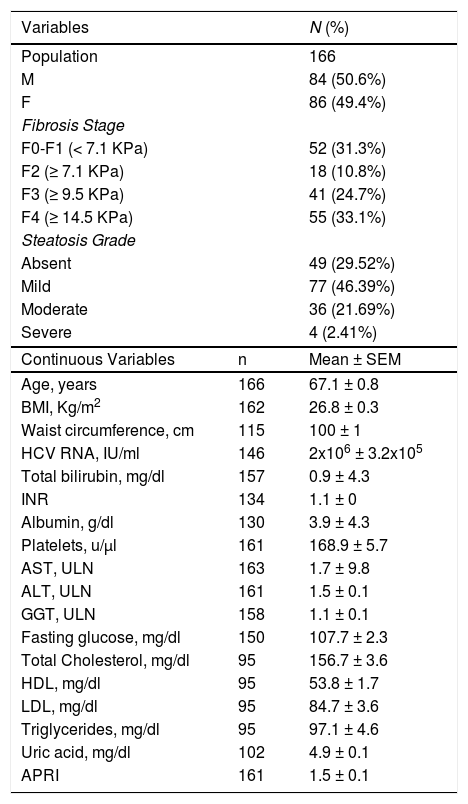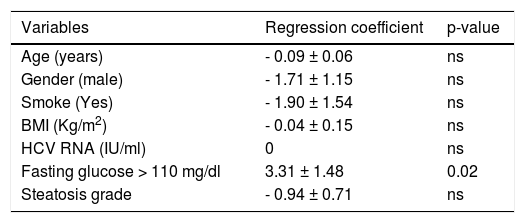Despite chronic hepatitis C (CHC) is still a global burden as the high morbidity and mortality, the recently approved direct-acting antivirals (DAAs) permit a very high rate of sustained virologic response (SVR) in these patients. The clinical improvement due to viral eradication is being documented, however it is not clear why a subset of patients does not benefit in terms of fibrosis regression or hepatocellular carcinoma (HCC) development. Aim of the study was to assess the hepatic stiffness regression at SVR24 and detect factors impacting stiffness course.
Patients and methodsHepatic stiffness assessed by acoustic radiation force impulse (ARFI) and anthropometric- and biochemical parameters were retrospectively collected by 166 CHC patients treated with DAAs, form baseline and SVR24.
ResultsViral eradication significantly improved overall hepatic stiffness and other related hepatitis hallmarks such as ALT, AST, γGT, platelets count, AST to Platelets ratio Index (APRI), total- and LDL cholesterol. The multiple regression analysis showed that patients with baseline glucose > 110mg/dl presented a stiffness regression significantly lower when compared to low glucose patients (<110mg/dl), moreover baseline HbA1c strongly correlated with DeltaStiffness. 7 patients (4.2%) developed HCC and importantly, presented hyperglycaemia and no stiffness regression nor platelets count recover.
ConclusionsAlthough viral eradication with DAAs entails overall benefits, glycaemic decompensation negatively affects fibrosis regression and probably facilitates HCC development.
Aunque la hepatitis C crónica (CHC) sigue siendo una carga global debida a la alta morbilidad y mortalidad, los antivirales de acción directa (AAD) recientemente aprobados, permiten un índice muy alto de respuesta virológica sostenida (RVS) en estos pacientes. La mejoría clínica debida a la erradicación viral está siendo documentada, pero no está claro por qué un subconjunto de pacientes no se beneficia en términos de regresión de fibrosis o desarrollo de carcinoma hepatocelular (HCC). El objetivo de este estudio fue evaluar la regresión de la rigidez hepática en SVR24 y detectar los factores que afectan el curso de la rigidez.
Pacientes y métodosLa rigidez hepática evaluada por la radiación acústica de la fuerza de impulso (ARFI) y los parámetros antropométricos y bioquímicos fueron recolectados retrospectivamente por 166 pacientes con CHC tratados con ADD, desde el punto de partida y SVR24.
ResultadosLa erradicación viral mejoró significativamente la rigidez hepática general y otros signos relacionados con la hepatitis, como ALT, AST, γGT, conteo de plaquetas, índice da razão AST/plaquetas (APRI), colesterol total y LDL. El análisis de regresión múltiple mostró que los pacientes con glucosa basal >110 mg/dL tuvieron una regresión de rigidez significativamente inferior en comparación con los pacientes con glucosa baja (<110 mg/dL), además la HbA1c de referencia se correlacionó fuertemente con DeltaStiffness. Siete pacientes (4,2%) desarrollaron CHC y, lo que es más importante, presentaron hiperglucemia y no hubo regresión de rigidez ni recuperación del conteo de plaquetas.
ConclusionesA pesar de que la erradicación viral con AAD conlleva diversos beneficios, la descompensación glucémica afecta negativamente la regresión de la fibrosis y probablemente facilita el desarrollo de CHC.












